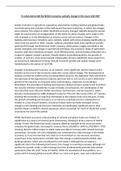To what extent did the British economy radically change in the years 1625-88?
Drastic evolution in agriculture, supporting urbanisation, fuelling national and global trade,
was financed by the evolution of the baking and insurance industries, in which the changes
were colossal. The extent to which the British economy changed radically during the period
might be measured by an amalgamation of the extent to which changes were made in the
role of people or in the distribution of revenue across various sectors. Changes in the
banking and insurance industries were certainly radical, with prices dropping significantly as
more trust was placed in them. Equally, national and global trade show significant growth,
particularly through the British East India Company, which grows roughly sevenfold in the
period. Alongside vast changes in agricultural technique, the economic shape of agriculture
evolved, with more emphasis on larger, more efficient farms, and increasing production of a
surplus to support London’s growth. Despite deaths outnumbering births, the growth of
London, as part of a mass-move towards Urbanisation shows a significant move away from
an economy of subsistence farming. Overall, economic growth and radical change were
fundamental to the period of 1625-88.
Changes in banking and insurance, as an industry, were significant, but the impact of this
industry on the rest of the economy makes this a truly radical change. The development of
banking can best be evidenced by increasing liberty given by the legislation that restricted it.
The decrease of the legal limit for interest rate from 10% in 1571 to 6% in 1651 reflects the
growth of the industry; as it became more commonplace, scepticism surrounding it
diminished. The principles of banking and insurance being to finance projects and to protect
the security of these investments in case of drastic circumstances, the combination of the
two industries was critical for British merchants. Furthermore, marine insurance, which
became commonplace by 1688, dropped in price by 75% over the course of the 17 th century,
showing the economies of scale that developed as the industry took root and grew. Finally,
the growth of banking and insurance as an industry contributed to the urbanisation of
London as a new class of bankers, insurance brokers and merchants emerged. Hence,
changes in the banking and insurance industries are particularly significant due to their
positive impact on British colonial expansion, which accounted for much of the British crown
revenue by the end of the period.
While the British economic understanding of national and global trade was limited, its
significance as a source of revenue grew enormously, showing it to be a source of radical
change. Firstly, the British East India Company, albeit an example of the most successful
company for global trade, increased its revenue from £100,000 in 1640 to £700,000 in 1700,
showing that the radical extent to which trade was able to increase with colonial overseas
possessions. Secondly, the 1651 Navigation Act contributed to radical change in the British
economy, as it set into law that any trade to or from Britain or any overseas territories
would have to be conducted in a British ship. This change revolutionised the British ship-
building industry, which also contributed to merchantry. Although the act played a
significant role in the following Dutch wars, this change to a warring economy, although not
positive for growth, made a radical change from the predominantly peaceful early period,
particularly after the 1630 Treaty of Madrid. While the drawbacks of mercantilism, as a
system which viewed global economic affairs as a zero-sum game, were not understood




